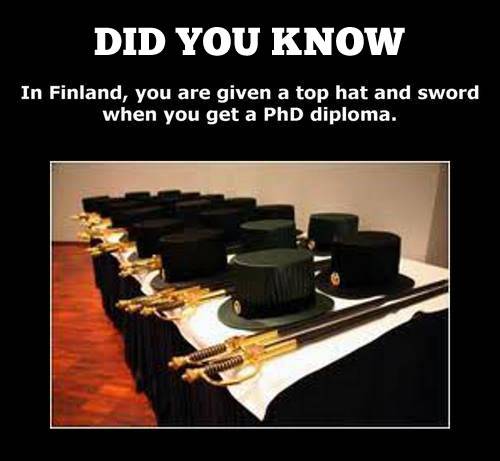- Joined
- Jul 13, 2013
- Messages
- 6,263
This is wonderfully exotic and foreign. Most impressed. If you want to get ahead, get a hat. Just what the doctor ordered. And a sword....


https://en.wikipedia.org/wiki/Doctoral_hat
"A doctoral hat (Finnish:tohtorinhattu, Swedish:doktorshatt) is a major part of the academic dress of Ph.D. recipients in Finland and Sweden. It is a silken top hat with a straight brim, although the hats of Finnish Doctors of Science (Technology) have an up-turned brim. Generally the colour of the hat is black, although a few faculties use coloured doctoral hats. On the front, the hat has a gold-coloured metallic emblem of the granting university or faculty. The hat is awarded in a solemn graduation ceremony.
Features
The basic colour of the hat is black. However, in Finland, other colors are found, as follows:
Obtainment and use
Doctoral hats are handmade, with the owner's head measured using a device called a conformateur. The hat should rest on the top of the head. The typical price for the doctoral hat is around 500 euros.
A doctoral hat is always worn with the white tie style of formal dress in lieu of a top hat. In practice, the hat is mostly worn on academic occasions, such as opening ceremonies, commencement, and disputations. In the disputations, the supervising professor and the opponent carry their hats, but do not wear them. During disputations, the hats rest on the table, with the university emblems towards the audience.
A doctoral hat is personal and is usually not lent to others. Along with the doctoral sword (found in Finland only, and not in all faculties), doctoral pike (found in Scotland only) doctoral bulawa (found in Ukraine and Poland), doctoral tailcoat facings (in certain universities / for certain degrees, e.g., for the degree of Doctor of Science in Technology at Aalto University), doctoral Bibles (in theological faculties), and doctoral rings(in Sweden), it forms part of the doctoral academic regalia.
The hat is usually stored in a specially made storage box"


https://en.wikipedia.org/wiki/Doctoral_hat
"A doctoral hat (Finnish:tohtorinhattu, Swedish:doktorshatt) is a major part of the academic dress of Ph.D. recipients in Finland and Sweden. It is a silken top hat with a straight brim, although the hats of Finnish Doctors of Science (Technology) have an up-turned brim. Generally the colour of the hat is black, although a few faculties use coloured doctoral hats. On the front, the hat has a gold-coloured metallic emblem of the granting university or faculty. The hat is awarded in a solemn graduation ceremony.
Features
The basic colour of the hat is black. However, in Finland, other colors are found, as follows:
- Doctors of Fine Arts use dark blue;
- Doctors of Law use crimson;
- Doctors of Medicine and Dentistry use dark green;
- Doctors of Military Science use grey;
- Doctors of Music use sky blue;
- Doctors of Theology use purple.
Obtainment and use
Doctoral hats are handmade, with the owner's head measured using a device called a conformateur. The hat should rest on the top of the head. The typical price for the doctoral hat is around 500 euros.
A doctoral hat is always worn with the white tie style of formal dress in lieu of a top hat. In practice, the hat is mostly worn on academic occasions, such as opening ceremonies, commencement, and disputations. In the disputations, the supervising professor and the opponent carry their hats, but do not wear them. During disputations, the hats rest on the table, with the university emblems towards the audience.
A doctoral hat is personal and is usually not lent to others. Along with the doctoral sword (found in Finland only, and not in all faculties), doctoral pike (found in Scotland only) doctoral bulawa (found in Ukraine and Poland), doctoral tailcoat facings (in certain universities / for certain degrees, e.g., for the degree of Doctor of Science in Technology at Aalto University), doctoral Bibles (in theological faculties), and doctoral rings(in Sweden), it forms part of the doctoral academic regalia.
The hat is usually stored in a specially made storage box"



